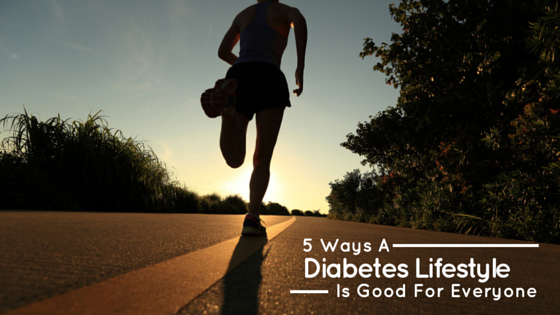Diabetes is a group of metabolic diseases in which a patient has a high blood sugar due to the body’s inability to regulate, produce, or respond to insulin—or all of the above. Diabetes is a serious disease that causes more deaths each year than breast cancer and AIDS combined, and it also increases the risk of several other diseases, like heart attacks and blindness.
The truth of the matter is that while a diabetes diagnosis can be seen by some as a wake-up call or a call-to-action, the lifestyle changes this disease requires are good for everyone. Read on to see how life with diabetes could result in a better life for all.
Diabetes can help you—and everyone around you—live consciously.
A diabetic does not take his or her body’s relationship with food or exercise for granted. They are aware—almost to an exhausting extent—of how their body reacts to stress, hormones, activity, and every bite they eat. To successfully manage diabetes, diabetics must be consciously tuned into twinges, jitters, temperature, behavior, and triggers.
Constantly.
Like so many things, however, it’s about balance. While settling the wobble is complicated, it is one that every diabetic must learn. The more insight they have, the smaller the coarse corrections, and the easier this task is to handle. To be the best guardians of their health, diabetics must check-in with themselves, read situations, make assessments, and take quick action. Couldn’t we all benefit from this kind of awakening?
Diabetes can open the door to better food.
Every diabetic, and every one who loves one, will tell you they never looked at food the same way after being diagnosed. And, in many ways, that’s a very good thing.
It forces a change of mindset: “I’m not missing out on those foods, I’m getting a chance to eat some better ones.” Removing processed food from your diet actually widens your flavor palate and helps develop a greater appreciation for fresh and wholesome food. Diabetics, and the family and friends who share their meals, soon find they don’t have to work as hard on weight maintenance or keeping up energy levels when they eat good, wholesome food in its unprocessed and natural state. Life-changing, indeed.
What steps will you take to enjoy real, life-giving food today?
Diabetes can make you stronger.
That being said, any diabetic will tell you managing the disease is so much more than watching what you eat. How you exercise is also important—and notice we didn’t say if. Exercise, particularly when it is a combination of aerobic activity and strength training, is a crucial part of keeping insulin and sugar levels in check; it helps medications work more effectively, relieves stress, promotes better mental health, and makes improvements in blood glucose levels.
For these and many other reasons, exercise is a vital part of being a healthy human. Find an activity you truly enjoy and it won’t feel like something you have to do. It doesn’t matter how or what you start, only that you do. And that you do it three to four times a week for at least 30 minutes.
Diabetes creates community.
Humans are a social species. Relationships matter. This is true of marriages, friendships, and the support of like-minded (and like-bodied) individuals with diabetes. Diabetes management can be overwhelming, difficult, frustrating, and maddening, and it would remain so if it were not for the people who can bind together to help each other through it. Having a community of people who understand, who have impactful suggestions, and who can push you into a positive mindset is not only an important part of living with diabetes, but of being a human in general.
The diabetic community is a strong one, both in the support for a cure and the support for a cause. We could all benefit from a sense of community like that, whether it surrounds a cause or a club. No matter where you are in the world, life is better when you engage with it.
Diabetes teaches compassion.
Diabetes teaches compassion, not only for those who struggle (which is everyone, at least some of the time), but also for ourselves. It teaches us not everyone has control over their temperament, their reactions, their bodies, or their lives. That recognition and lack of judgment is a kindness, and one we can all learn and benefit from.
Unlike diabetes, compassion is highly contagious. Kindness leaves a mark on everything it touches, so reach out, make connections and eye contact, sympathize, and learn.
Diabetics know the true value of wholesome food, strong relationships, interwoven communities, advocacy, and ripple effects. It goes to show that a diabetes diagnosis is not the end of the world. It could—and should—be the start of a much better one.
If you have a diabetic in your life who inspires you to be healthier, share your story below! If you’re interested in learning more about living with diabetes for yourself, loved one, or friend, join us at our FREE Diabetes Wellness Fair on Saturday, October 10 from 10:00 am – 1:00 pm at the Sioux City Convention Center.

